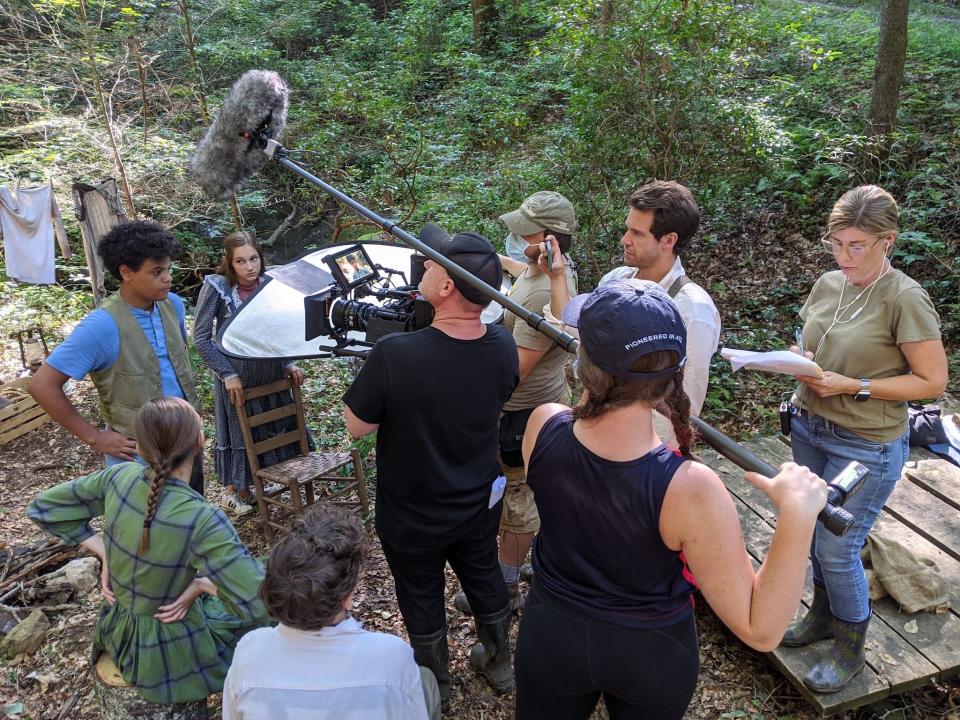Lights! Camera ! Action!: Report outlines growth of film, entertainment in Georgia
Georgia's rapid rise as a film powerhouse has helped grow the statewide entertainment industry, including in the realms of video games, music and post production, according to a new report from the Creative Media Industries Institute at Georgia State University.
But local governments and colleges have already noticed the trend, and in recent years stepped up to fill a need.
"From my perspective, coming from the film and television industry, I was thinking, well, we're not only educating students in film and TV, but gaming and music and media entrepreneurship," said Brennen Dicker, executive director of the CMII at Georgia State. "And so I really wanted to just start looking around and see what the broader ecosystem was."
More: First trailer for baseball movie filmed in Augusta is out. What local scenes made the cut?
Also Augusta University continues to grow, says Brooks Keel in annual address
Rapid growth of entertainment industry
Between 2008 and 2019, Georgia's creative sector grew 210%, the largest increase in the country, with an annual impact of $19 billion, the report found. The film industry spent about $4 billion directly in 2020. (For comparison, the poultry industry has a $28 billion economic impact on the state, according to the US Department of Agriculture.)
Dicker argues that the growth was spurred by Georgia's film tax credit, which last year cost the state $1.3 billion. While acknowledging the credits are controversial, Dicker argues that they allowed Georgia to outcompete other Southeastern states that capped or reduced incentives to create the success that Georgia sees today.
It is not just shooting film, either. Post-production work once was all done in California. When everyone went remote during COVID, Dicker said, people found they could do the same work remotely. Georgia had a lower cost of living, but was still close enough to major production hubs to allow in-person meetings when necessary.
Game studios in the state have grown from eight in 2005 to 141 currently, the report said, with about $750 million dollars a year in economic impact. Music, which overlaps with both gaming and film, generates about $2.7 billion annually.
"It's quite remarkable that a state in 15 years time can ... be known as a global leader in entertainment and film and television that competes against California and New York," Dicker said.

Atlanta and beyond
The core of the film industry in Georgia is still indisputably Atlanta, but the report calculates that every region of the state has seen some growth in the number of people employed in creative industries. The largest growth has been in Savannah. The area around Gainesville and Columbus have also seen increases, Dicker said. Athens recently opened the new, $60 million Athena studio.
Jennifer Bowen, film liaison with Film Augusta, has worked in tourism locally for 20 years, but in 2015 the interest began to grow as the state's tax credit brought more productions to the state.
"As film began to grow rapidly in the state of Georgia, people were looking to reach film contacts," Bowen said. "And they were not searching for 'convention' and 'visitor bureaus.' They were searching for the words 'film.'"
More: 'The Menu' needed to melt its customers sweetly so a Savannah chocolatier stepped in
Since 2019, Bowen said, films have brought about $5 million to the local economy, mostly through smaller, independent productions.
"We started to see an interest in small indie productions, who were able to take advantage of the state's tax credit, and ... looking for places to film outside of Atlanta or Savannah, in order to have an ease of business, if you will, and also be able to work on smaller budgets," Bowen said.
Studio-backed films tend to stick to Atlanta for reasons of cost and to use major studio space, but with Atlanta being so busy now, Augusta gets some of the overflow.
"The films that get pushed out of Atlanta are the films that are right for Augusta," Bowen said. "And so we expect for that opportunity and that potential for business to continue to grow."
Educational opportunities
With the rise in productions, students are looking for programs that will train them in the skills needed for these jobs, and Georgia colleges are working to meet the demand, with over have of the state's universities expanding their film programs, according to Dicker.
Shandra McDonald is the director of production at Trilith Campus in Fayetteville, Georgia, and an assistant film professor with the MFA program at the University of Georgia. The two organizations have a partnership, and her students start at UGA before quickly moving to get hands on experience at the studio.

"They're around industry professionals, they're around film, filmmakers, and around studios, working studios ... and the ones at those studios make a great way to incubate them while they're giving birth to these thesis films," McDonald said.
Her students, who come not only from Georgia but also across the country and beyond, focus on above the line skills to create and direct films. Like many film programs in the state, it is relatively new, but the students that have already graduated have found jobs locally and across the country.
More: Lights, camera, Athens: $60 million sound-stage development breaks ground
"We want this community to feel that we can create above the line writers, producers and directors, like you can in any other markets, or any film schools," she said.
Augusta University is also expanding its educational programs to prepare students for jobs in entertainment. In 2019, A.B. Osborne, director of the animation program and assistant professor, helped launch an animation program at AU.
"Our first cohort of students was maybe six students, but we knew that there was a huge demand," he said. "...I think the numbers are around 60 or 70 now."
Now the university is launching a new hub with animation labs, an e-sports arena and more. They are adding programs to the animation, and recently launched a digital storytelling major.

Augusta University can provide this education at public school prices, and with strong job prospects within the state. Atlanta has a strong market for 2D animation and mobile games, but also more mundane kinds of animation — previsualization for feature films, animated text and graphics, and similar jobs.
"My students are taking this because they want to get a job," Osborne said. "And that was a conversation, we wanted to build something that was going to be great for the industry."
Augusta Tech was also able to offer Georgia Film Academy classes last year, Bowen said, and hopes to do so again in future.
Growth and what comes next
The film industry continues to grow in Georgia, but the future may be broader than that. Dicker thinks augmented reality and other new forms of entertainment will continue to grow alongside more traditional entertainment like film and television. McDonald sees some of her students looking not only at live action film but animation, too.
"We do think that with the tax credit, and with these opportunities, across education ... that there'll be a lot of convergence across different medias, and we love that," she said.
The film and entertainment industry may be a smaller portion of the economic activity of the state, but Dicker thinks the economic contribution and the reputational boost to the state have been significant.
"When you have someone come to come up to you and say, 'Oh, you live in Georgia, that's where they make movies' ... that alone is is worth a lot," Dicker said.
This article originally appeared on Augusta Chronicle: Georgia film, entertainment industry grows, education follows

